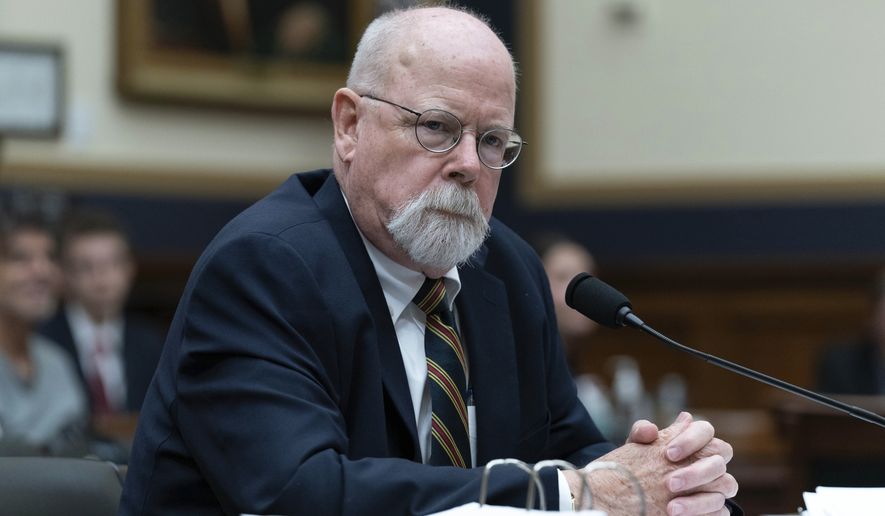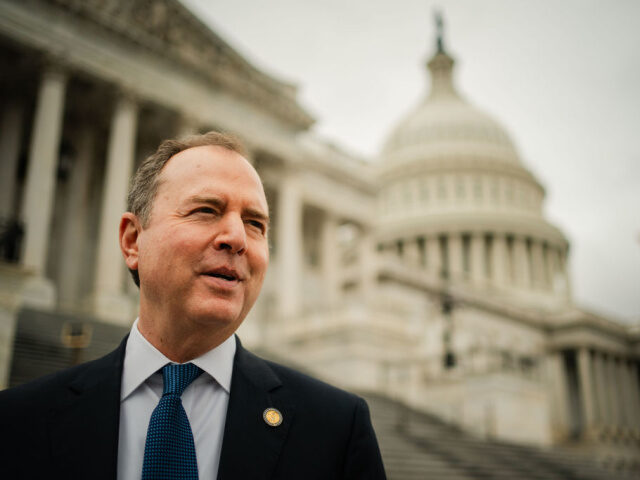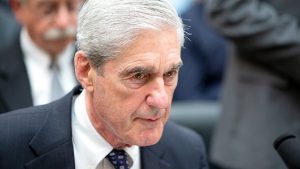Durham says FBI agents became emotional, apologized over bureau’s handling of Trump probe

Special counsel John Durham said Wednesday that FBI agents working on the Trump-Russia investigation became emotional and apologized after being confronted by intelligence suggesting that the investigation could have been part a Hillary Clinton 2016 campaign plan to distract attention from her use a private email account.
In his first testimony in public since he started his four-year-long investigation into the way FBI agents investigated allegations linking Mr. Trump with Russia, Mr. Durham claimed that bureau brass had kept critical information from the agents who were working on this probe.
Mr. Durham said that FBI officials “were too willing to accept and to use uncorroborated and politically funded opposition research,” paid for by Clinton’s campaign, to launch the Trump investigation in 2016. He claimed that the FBI relied on too much of the Steele dossier – a collection unverified and salacious accusations linking Mr. Trump with Russia – and Foreign Intelligence Surveillance Act applications.
He said that “the FBI relied upon the dossier and FISA requests, knowing that there was likely material coming from a campaign or an opponent’s political campaign.”
|
Mr. Durham explained how top FBI officials did not inform agents that these allegations were part the “Clinton Plan Intelligence,” information that was received by the FBI from a reliable foreign source that suggested that the Clinton campaign planned to demonize Mr. Trump through a conspiracy to link him to Russia.
When FBI agents who were working on the Trump investigation saw the intelligence, they apologized to Mr. Durham, he said.
“I’ve had a number of FBI agents… apologize to me for the way that this investigation was conducted. This is something I take very seriously. “These are hardworking, good people,” he said to lawmakers.
He said: “I think this typifies and exemplifies our concern.” “There have been investigative activities that were undertaken or not undertaken which raises concerns as to whether the law or policies at the FBI was followed.”
When Mr. Durham’s team presented the intelligence information to Joe Pientka – the first supervisor in the Trump investigation known as Crossfire Hurricane – he said he hadn’t seen it before.
Mr. Durham stated that the agent was “immediately emotional”, left the room and spoke to his lawyer in the hallway, then returned.
Jim Jordan, Ohio Republican chairman of the Judiciary Committee, asked if Mr. Pientka had been “ticked off”, because he was supposed to have known this information.
Mr. Durham responded, “The information had been kept from him.”
According to the 400-page report by Mr. Durham, the “Clinton Plan Intelligence”, the “Clinton Plan Intelligence,” concerned Mrs. Clinton’s purported approval in July 2016 by one of her advisers on foreign policy to “stir up scandal” against Mr. Trump through linking him with Russia and the hacking the Democratic National Committee.
John O. Brennan, the CIA director at the time, briefed Vice President Joseph R. Biden in July 2016 and President Obama about intelligence. According to Mr. Durham’s reports, Mr. Brennan passed the information on to FBI Director James B. Comey, and Peter Strzok – deputy assistant director for counterintelligence.
Mr. Durham stated that it was not clear whether the Clinton Intelligence Plan based its information on accurate data. He said FBI agents should have scrutinized the Trump-Russia allegations more.
In his report, Mr. Durham stated that “it should have motivated FBI personnel to undertake an immediate analysis of the material and to act far more carefully and cautiously when receiving, analysing, and relying on materials of partisan origines.”
In his testimony Wednesday, Mr. Durham was able to defend himself and his investigation against the scathing criticism of Democrats. He was accused of launching an investigation that had a predetermined result in favor of Mr. Trump.
Steve Cohen, a Tennessee Democrat, said: “You had a great reputation.” “But the more you stay, the worse your reputation gets, because everyone’s who is involved with Donald Trump will have a damaged reputation, he’s damaged products.”
Rep. Jerrold N. Nadler, of New York, who is the top Democrat in the panel, accused Mr. Durham, of weaponizing Justice Department, by using his “flimsy ” probe to harass Trump critics and appease “far right conspiracy theorists”.
In his opening remarks, Mr. Durham denied that politics was the motive behind his investigation.
“I am concerned about my reputation with people I respect and my family and Lord.” “I’m completely comfortable with my reputation among them,” Mr. Durham replied to questions about political bias.
Mr. Durham refuted the claims of political bias, stating that the Biden Justice department never prevented him from bringing high profile prosecutions during his investigations.
When asked if Attorney General Merrick G. Garland prevented him from indicting anyone he wanted, Mr. Durham replied, “No.”
“Attorney general Garland never asked me to not indict anyone,” Mr. Durham stated.
During his testimony Mr. Durham stated that he could have brought charges against anyone – including Mrs. Clinton – if the evidence warranted a criminal indictment. He said he did not have any evidence to back up criminal charges against Hillary Clinton.
Rep. Eric Swalwell (California Democrat) asked: “You had the right to indict anyone and had the evidence to do so, but you were never prevented from doing so?”
“That is correct,” Mr. Durham replied.
Republicans have criticized Mr. Durham for not filing criminal charges in his investigation into the wrongdoing of FBI officials who investigated the allegations that Trump had colluded to win the 2016 presidential election with Russia.
He did not file charges against Obama-era FBI agents, including two who were referred to the Justice Department.
Rasmussen’s poll of likely voters, released last month, found that 59% said FBI officials should be prosecuted for promoting claims linking Trump to Russia.









No Comments